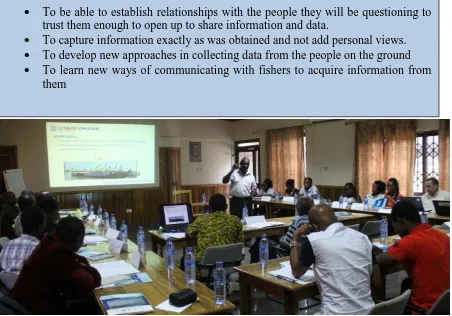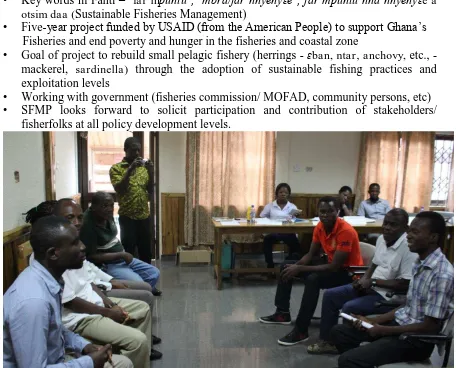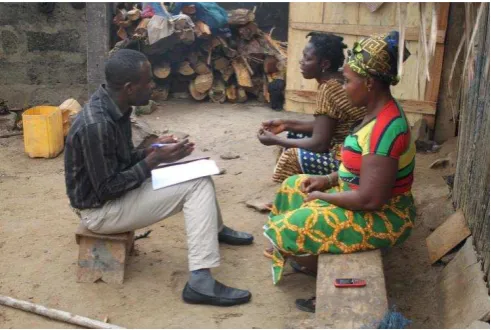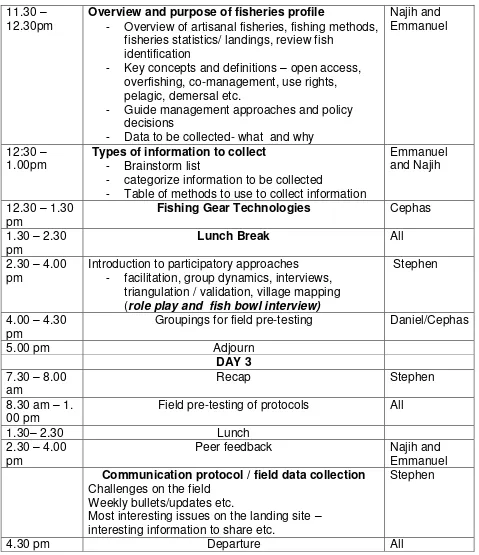SUSTAINABLE FISHERIES
MANAGEMENT PROJECT (SFMP)
Small Pelagic Fisheries Data
Collection: Orientation Training Report
This publication is available electronically on the Coastal Resources Center’s website at
http://www.crc.uri.edu/projects_page/ghanasfmp/ and Hen Mpoano’s website at
http://www.henmpoano.org
For more information on the Ghana Sustainable Fisheries Management Project, contact:
USAID/Ghana Sustainable Fisheries Management Project Coastal Resources Center
Graduate School of Oceanography University of Rhode Island
220 South Ferry Rd.
Narragansett, RI 02882 USA
Tel: 401-874-6224 Fax: 401-874-6920 Email: [email protected]
Citation: Asare, C., Owusu, A.A., Kankam, S., Nortey D.D.N. (2015). Small pelagic
fisheries data collection: orientation training report. The USAID/Ghana Sustainable Fisheries Management Project (SFMP). Narragansett, RI: Coastal Resources Center, Graduate School of Oceanography, University of Rhode Island and Hen Mpoano. GH2014_ACT049_HM. 21 pp.
Authority/Disclaimer:
Prepared for USAID/Ghana under Cooperative Agreement (AID-641-A-15-00001) awarded on October 22, 2014 to the University of Rhode Island and entitled; the USAID/Ghana Sustainable Fisheries Management Project (SFMP).
This document is made possible by the support of the American People through the United States Agency for International Development (USAID). The views expressed and opinions contained in this report are those of the SFMP team and are not intended as statements of policy of either USAID or the cooperating organizations. As such, the contents of this report are the sole responsibility of the SFMP Project team and do not necessarily reflect the views of USAID or the United States Government.
Cover photo: Group picture of participants at the end of day two of the training workshop
Detailed Partner Contact Information:
USAID/Ghana Sustainable Fisheries Management Project (SFMP) 10 Obodai St., Mempeasem, East Legon, Accra, Ghana
Brian Crawford Chief of Party [email protected]
Najih Lazar Senior Fisheries Advisor [email protected]
Patricia Mensah Communications Officer [email protected]
Bakari Nyari Monitoring and Evaluation Specialist [email protected]
Don Robadue, Jr. Program Manager, CRC [email protected]
Justice Odoi USAID Administrative Officer Representative [email protected]
Kofi.Agbogah
SNV Netherlands Development Oganization #161, 10 Maseru Road,
E. Legon, Accra, Ghana 233 30 701 2440
Donkris Mevuta Kyei Yamoah
[email protected] Friends of the Nation Parks and Gardens Adiembra-Sekondi, Ghana 233 312 046 180
Peter Owusu Donkor Spatial Solutions
[email protected] #3 Third Nautical Close,
Nungua, Accra, Ghana
Darkuman Junction, Kaneshie Odokor Highway
Headmaster residence, Sekondi College Sekondi, Western Region, Ghana 233 243 326 178
For additional information on partner activities: CRC/URI: http://www.crc.uri.edu
CEWEFIA: http://cewefia.weebly.com/
DAA: http://womenthrive.org/development-action-association-daa Daasgift:
https://www.facebook.com/pages/Daasgift-Quality-Foundation-FNGO/135372649846101 Friends of the Nation: http://www.fonghana.org Hen Mpoano: http://www.henmpoano.org
SNV: http://www.snvworld.org/en/countries/ghana SSG Advisors: http://ssg-advisors.com/
ACRONYMS
CRC Coastal Resources Center at the Graduate School of Oceanography, University of Rhode Island
FC Fisheries Commission FoN Friends of Nation FtF Feed the Future
FSSD Fisheries Statistical Survey Division
HM Hen Mpoano
GoG Government of Ghana
ICFG Integrated Coastal and Fisheries Governance IUU Illegal Unreported Unregulated
MOFAD Ministry of Fisheries and Aquaculture Development M&E Monitoring and Evaluation
SFMP Sustainable Fisheries Management Program URI University of Rhode Island
TABLE OF CONTENTS
Acronyms ... ii
Introduction ... 1
Expectations of Trainees ... 2
Summary of Presentations ... 2
Overview of SFMP and Purpose of Training ... 2
Questions, comments and Responses ... 5
Fishing Gear Technologies ... 6
Questions, Comments and Responses... 8
Data Collection Process ... 10
Fisheries Data Management ... 11
Training Outcomes... 13
Lessons Learned... 13
Next Steps ... 14
Annex ... 15
LIST OF FIGURES
Figure 1: Participnants listening to presentation on the overview of SFMP ...2Figure 2: Participants introducing SFMP to community leaders in a roleplay ...6
Figure 3: Participants during data stratification exercise ...12
INTRODUCTION
The Sustainable Fisheries Management Project (SFMP) is a five years USAID/Ghana-funded project. The goal of the SFMP is to rebuild targeted marine fisheries stocks through the adoption of sustainable fishing practices and exploitation levels. With a focus on small pelagic fisheries management along the entire coastal stretch of Ghana, the SFMP seeks to rebuild a fishery, which is near collapse; more than 100,000 metric tons of high quality low-cost animal protein that was traditionally available to poor and vulnerable coastal and inland households have been lost.
The SFMP will work closely with the Government of Ghana (GoG) through the Ministry of Fisheries and Aquaculture Development (MOFAD) under the World Bank-funded fisheries project as well as with the Fisheries Commission (FC) to achieve the goal of revamping the fisheries sector.
The small pelagics fisheries profile forms part of a process leading to a longer term adaptive fisheries co-management planning process for the small pelagic complex at the national level. This study will characterize the current and historical trends of fishing fleet, gears, species targeted, fishing operations, fishing areas, seasons, harvesting and processing capacity of the sector, support businesses, the people engaged in all aspects of the harvest and post-harvest, infrastructure, communities dependent on fishing, and the significance of the artisanal fishery to local, and regional economies.
The purpose of the profile is to develop a baseline fisheries profile addressing ecological, socio-economic and governance components and it is also intended to be used at the first national dialogue to guide policies and management decisions related to:
1) various fishery management strategies 2) potential industry’s capacity reduction plans 3) economic development initiatives
4) infrastructure investments
5) Community and marine fisheries spatial planning.
This two day small pelagics fisheries profile training is two of such trainings for data
collectors. The aim of the two-day training workshop was to orient data collection team to the purpose of assessment and data collection protocol, develop a common language to explain the SFMP to local community leaders and provide response about the project, test and modify as needed data collection methods and processes, and plan for field data collection.
A total of about 25 participants attended the two-day training workshop. These included Regional M&E Officers of the Fisheries Commission, Deputy Director of Fisheries Statistical Survey Division (FSSD). Others in attendance were selected staff of three SFMP
EXPECTATIONS OF TRAINEES
Figure 1 Participannts listening to presentation on the overview of SFMP
SUMMARY OF PRESENTATIONS
The presentations delivered by technical staff of SFMP and FC outlined the overview of the project, how to communicate and respond to questions about SFMP, fishing gear technology, data collection process and fisheries data management. Below is the summary of the
presentations with selected slides from the presentations. Overview of SFMP and Purpose of Training
Kofi Agbogah, National Activity Manager for SFMP
The Integrated Coastal and Fisheries Governance (ICFG) project implemented in the Western Region was a four year (2009-2014) fisheries and coastal project popularly known as Hen Mpoano which has evolved into a local organization because of its popularity.
In the four years of ICFG project, a lot of lessons were learnt; among them, the lost of most of our sardinella fishstock over the years and the need for immediate intervention.
The purpose of the Sustainable Fisheries Management Project (SFMP), therefore, is to support the Fisheries Commission to put in place measures to revamp the declining sardinella. The SFMP in year one will focus on small pelagic fisheries management that spans the entire coast. There is therefore the need to know the history behind what has happened and what is happening within the fisheries sector. It is for this reason that this
Expectations of data collectors for the training workshop
The expectations of participants in terms of what to learn, know and acquire during the training workshop are summarized below:
To be able to establish relationships with the people they will be questioning to trust them enough to open up to share information and data.
To capture information exactly as was obtained and not add personal views. To develop new approaches in collecting data from the people on the ground To learn new ways of communicating with fishers to acquire information from
profiling exercise is critical. The fisheries profiling exercise will also serve as a way of improving Fisheries Commission data systems and stock assessment capacity.
Selected slides
Per capita fish consumption in Africa. This is highest in West Africa
Sardinella, the mainstay of the artisanal fisheries industry, has over the years witnessed continuous decline leading to
near collapse of the fisheries.
The SFMP focus will cut across the entire coastline of Ghana.
Questions, comments and Responses
Communicating and responding to questions about SFMP
Patricia Aba Mensah, Communication Officer for SFMP
To communicate the SFMP to stakeholders and Communities and to become ambassadors of the project, it is important to understand the project goals and the effective language to communicate these goals. Below are some few pointers:
• Anticipate a lot of questions such as ‘where are you coming from?’ ‘Are you bringing us money?’‘We’ve seen a lot of your kind and are tired of you people, how different are you?’ etc.
• You need to identify with the target audience (community); speak their language • Be humble; do not show off; do not judge
• Communicate the ‘participatory’ element.
• Don’t hijack conversations; allow your colleagues and other persons to talk
• Your integrity is at stake – do not litter; do not argue before visitors; carry a united
• You should know the cultural dynamics e.g. When you go to chiefs you don’t sit with your leg crossed; others do not want women to talk
• You go to the field to learn and not to teach. It’s not up to us to challenge respondents. • We should let them know it’s a participatory exercise and we need their help.
• Do not argue among yourselves
• When you’re offered a drink and refusing it looks impolite, just collect and take a sip. Questions and Comments Responses
The turbidity of the pra and Ankobra could have environmental implications. Will there be any research under the SFMP to determine the metallic levels.
No, the focus of this project is to bring back the sardinnella into the sea, but there was a research studies under the ICFG project which looked into that phenomenon.
The objectives of the project is very welcoming
Should we really target only Sardinella This is the task for the project to see reverses in the decline overr the next five years. There is a big food chain involved The inclusion of Central, Greater Accra
and Volta Regions in the project is highly commendable. Will government buy into the objectives of the project?
We know government has some
• Key words in Fanti – ‘far mpuntu’; ‘mbra/far nhyehyɛe’; far mpuntu nna nhyehyɛe a otsim daa (Sustainable Fisheries Management)
• Five-year project funded by USAID (from the American People) to support Ghana’s Fisheries and end poverty and hunger in the fisheries and coastal zone
• Goal of project to rebuild small pelagic fishery (herrings - ɛban, ntar, anchovy, etc., - mackerel, sardinella) through the adoption of sustainable fishing practices and exploitation levels
• Working with government (fisheries commission/ MOFAD, community persons, etc) • SFMP looks forward to solicit participation and contribution of stakeholders/
fisherfolks at all policy development levels.
Figure 2 Participants introducing SFMP to community leaders in a roleplay
FISHING GEAR TECHNOLOGIES
Cephas Asare, Program Officer in Charge of Fisheries, Hen Mpoano
There are two main categories of gears, passive and active gear. The classification of gear is based on the relative behaviour of the target species and the fishing gear. Passive gears are stationary gears left in the water for a period of time. Example includes: gill nets, longlines, traps and pots. Active gears on the other hand go after the fish; they are either towed along the seabed or towed off the seabed. Examples includes: beach seine, bottom trawl, mid-water trawl and purse seines.
Selected slides
Fishing gears are categorized into passive and active gears based on the relative behavior of the target species and the fishing gear
Gill net is an example of passive gear
Questions, Comments and Responses
Local names of the gears used in the canoe fishery in Ghana
Questions and Comments Responses Is the project goal of bringing back the
sardinella fish into the sea doable?
Though the project could be delayed by political will there could also be a strong public will where fishers themselves can stand their grounds and demand change. E.g. can be taken from Ivory Coast, where community members comply willingly with laws and policies governing their fisheries resources although there are some levels of enforcement
What are some of the things that could be done to bring voluntary compliance?
Power should be restored back to the Chief fishermen to manage the fisheries There should be awareness creation at the community level by erecting sign posts at landing sites.
Community watch collapsed due to lack of incentives
Fish processors are not making enough money because of the illegal fishing activities
The chief fishermen are always guilty in one way or the other when it comes to illegal fishing activities.
Public perception of people brings too much pressure on people to make
money (social pressure, economic gains, political will, self will)
Most fish mongers have the challenge of
not being refunded, when they don’t
DATA COLLECTION PROCESS
Najih Lazar, Senior Fisheries Advisor for SFMP
The highlight of this presentation was on the importance of fisheries data and the application of fisheries data in fisheries management. It presented the definations of the many
terminologies as used in fisheries data collection and the ultimate use of fisheries data.
Selected slides
Capture fishery includes the resource, the gears for harvesting the resource, the science, the management of the fishery, the processing, the market, the consumer and the extension services supporting the fishery.
Information on fish exploitation rate, economic information and
environmental conditions affecting fish productivity make up fisheries data
FISHERIES DATA MANAGEMENT
Emmanuel Dovlo, Assistant Director of FSSD
This presentation was in two parts: stratification in data collection and standardization of data collection systems. The stratification in data collection aspect highlighted what influences the choice of data collection methods and the two major types of stratification. Standardization of data focused on the objective of standardization, factors to consider in the initial setup of a standardization system and the application of internationally recognised definitions, classifications and codes in standardization.
Selected slides
Fisheries data is essential for stock assessment, fishery management, strategic planning and business development
Fisheries data helps in setting goals about the ways in which fisheries data is obtained and the type of data that is lacking.
Stratification reduces error in sample estimation. This is achieved by dividing the sample population into groups or strata.
The primary objective of standardization is to facilitate integration between different data collection systems.
Figure 3 Participants during data stratification exercise
Figure 4 A trainee enagaging respondents during pre-test of data collection protocol
TRAINING OUTCOMES
Data collectors have an understanding of the importance of community entry in data collection and how community process is done.
Data collectors learned the importance of accurate data collection
The field pre-testing of protocol taught participants the need to respect the views of interviewee.
Data collection protocol was updated with feedback from pre-testing.
LESSONS LEARNED
Use of exercise to explain the different sampling strategy helped the participants to better understand and appreciate the different sampling strategy used in fisheries data collection.
Involving fisheries commission was very useful; personel provided insightful comments into the data collection protocol.
NEXT STEPS
The following points were identified as crucial to the commencement of data collection: • Development of contracts for data collectors
• Introduction of data collectors to the communities and stakeholders should be done through FC and the Assembly members in the communities should also be involved in the process.
• Data collection should commence soon after the training programme to achieve the set timeline.
ANNEX
Training program
Small Pelagic Fisheries Profile
Orientation Training and Planning for Field Data Collection May 3- 5, 2015
Participants
Fisheries data collectors SFMP Accra – Najih, Patricia
HM staff – Kofi, Daniel, Cephas, Justice, Adiza, Stephen
Fisheries Commission (Marine Research Division) – Emmanuel Dovlo, regional M& E focal persons
Objectives
Orient data collection team to purpose of assessment and data collection protocol Develop a common language to explain the SFMP to local community leaders and
provide response about the project
Test and modify as needed data collection methods and processes Plan for field data collection
Agenda
DAY 1 4. 00 – 7.00
pm
Arrival of participants; check in hotel and have dinner
DAY 2 8.00 – 9.00
am
Participant registration Justice
9.30 – 10.00 am
Welcome, introductions and logistics Stephen
10.00 – 10. 30 am
Opening of the training
Overview of SFMP – purpose, objectives and
Communicating and responding to questions about SFMP
(Role play and peer feedback on explanation to local community leaders)
11.30 – 12.30pm
Overview and purpose of fisheries profile
- Overview of artisanal fisheries, fishing methods, fisheries statistics/ landings, review fish
identification
- Key concepts and definitions – open access, overfishing, co-management, use rights, pelagic, demersal etc.
- Guide management approaches and policy decisions
Types of information to collect
- Brainstorm list
- categorize information to be collected
- Table of methods to use to collect information
Emmanuel and Najih
12.30 – 1.30 pm
Fishing Gear Technologies Cephas
1.30 – 2.30 pm
Lunch Break All
2.30 – 4.00 pm
Introduction to participatory approaches
- facilitation, group dynamics, interviews, triangulation / validation, village mapping (role play and fish bowl interview)
Stephen
4.00 – 4.30 pm
Groupings for field pre-testing Daniel/Cephas
5.00 pm Adjourn
Field pre-testing of protocols All
1.30– 2.30 Lunch
2.30 – 4.00 pm
Peer feedback Najih and
Emmanuel Communication protocol / field data collection
Challenges on the field Weekly bullets/updates etc.
Most interesting issues on the landing site – interesting information to share etc.
Stephen



